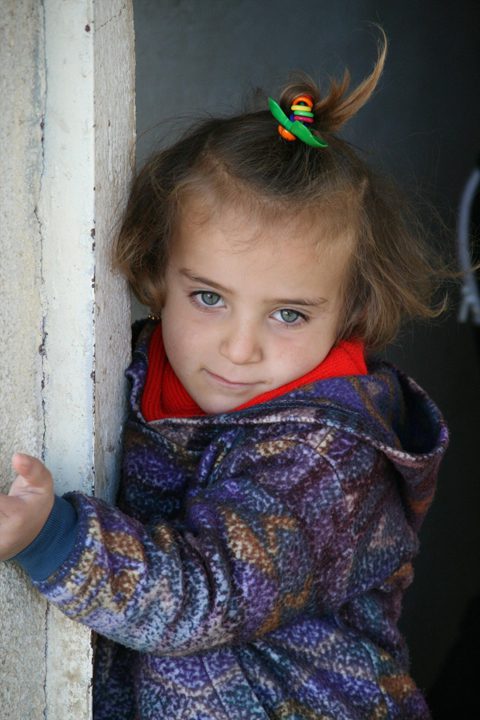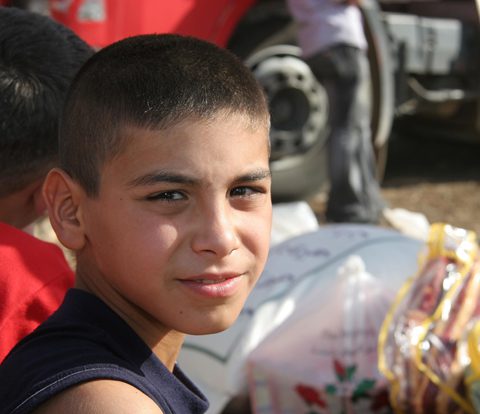Fewer than half of all veterans of the post-9/11 military say America’s intervention in Iraq to overthrow Saddam Hussein was worth the cost, according to a new poll from the nonpartisan Pew Research Center.
In Iraq, Christians are suffering terrible persecution as al-Qaida has returned with a vengence, retaking key parts of the country.
The Pew survey shows 44 percent of U.S. veterans believe the Iraq War was worth the cost. On the other hand, 50 percent believe American sacrifices in Afghanistan were worthwhile.
A burned-out U.S. tank (photo courtesy U.S. Army)
Was the purpose of the Iraqi war to drive out al-Qaida? The Obama administration is being criticized after al-Qaida has overrun parts of Iraq, including the city of Fallujah, in which the United States secured major casualties before the president removed all U.S. forces. U.S. forces took Fallujah in 2004 after some of the bloodiest battles of the war. Fallujah became notorious when insurgents murdered four U.S. contractors and hung their mutilated bodies from an overpass.
Senators John McCain and Lindsey Graham called al-Qaida’s victories “as tragic as they were predictable” and suggested Obama misled Americans into believing that Iraqi leaders wanted U.S. forces out of their country.
“While many Iraqis are responsible for this strategic disaster, the administration cannot escape its share of the blame,” the senators said in a joint statement. “When President Obama withdrew all U.S. forces … over the objections of our military leaders and commanders on the ground, many of us predicted that the vacuum would be filled by America’s enemies and would emerge as a threat to U.S. national security interests. Sadly, that reality is now clearer than ever.”
Was the intention of the war to secure oil for the United States? That accusation has been repeated frequently, but Iraq recently signed its first oil deal in 35 years with a foreign company.
“And – quite surprisingly to many observers – the company wasn’t one of ours,” reports Keith Fitz-Gerald, investment director for Money Morning. “Not surprisingly, the U.S. news media barely acknowledged the deal – even though the agreement was major news throughout the rest of the world. According to reports from Baghdad, the 22-year deal between the Iraqi government and the China National Petroleum Co. involves $55 billion, or 87 percent of Iraq’s current total revenue.
What is ahead for this Iraqi Christian child? (photo courtesy Open Doors International)
Iraq has held free elections and Iraqi’s mad tyrant Saddam Hussein was replaced with elected leaders, but can the Iraqi army hold onto the country? The al-Qaida fighters took over Fallujah after a bloody three-day battle, raising their flag over government buildings as a sign of victory, according to the Washington Post.
But if the purpose of the war was to establish religious freedom, it has been a terrible failure, writes Colin Freeman in the British daily The Telegraph. He reports that after a decade of war, Iraq’s Christians have dwindled from more than a million to as little as 200,000.
“As the last remaining Christian priest in the Baghdad suburb of Doura, Archdeacon Temathius Esha no longer just puts his trust in God’s all-seeing eye,” writes Freeman. “Built into the wall of his vestry, amid pictures of Catholic saints, is a 16-screen closed-circuit TV monitor,
keeping watch on every corner of his church in case of possible attack.
“Along with the armed guard outside and concrete anti-blast walls, it makes St Shmoni’s feel more like a fortress than a house of worship. And after a decade in which Doura’s Iraqi Christian community has been robbed, kidnapped and murdered by Islamist extremists, it finds itself offering sanctuary to an ever-dwindling flock.
“Doura was once one of the biggest Christian communities in Iraq, with 30,000 families,” said the archbishop, as he prepared for an afternoon congregation that barely filled two of the 22 rows of pews. “Now there are only 2,000 left. They feel they are strangers in their own land, and that makes them want to leave. The bleeding from migration is continuous.”
The Archbishop of Baghdad, Louis Raphael I Sako, has called on the West to help put an end to the ‘mortal exodus’ of Christians from the Middle East, reports World Watch Monitor. “Sako, who is also Patriarch of Babylon, told a conference in Rome that the situation in Iraq over the past 10 years has gone from bad to worse.
“‘In Iraq, after 10 years, we still don’t have security. There are daily attacks, explosions, kidnappings and murders,’ he said. The Iraqi Archbishop pointed towards the rise of political Islam as one of the major opponents of the Church in the Middle East, while he said the US-led invasion of Iraq has ‘destroyed the country.’
An Iraqi Christian (photo courtesy Open Doors International)
Suffering has become “an everyday struggle for all Iraqis, but especially for Christians,” he said. “Muslims are always strong enough with their tribes. They also have the advantage of living in a country ruled under Islamic orders. But Christians and other minority groups have been worn down by a worsening security situation.’
“Since 2003, Sako said,” reported World Watch Monitor, “more than 1000 Christians have been killed in Iraq (and others kidnapped and tortured), while 62 churches and monasteries have been
With al-Qaida once again on the rise in Iraq, “more than 6,000 people have been killed in 2013, the most in five years,” reported the Telegraph. “Christian communities such as Doura are already contemplating that very scenario.
“Today, St Shmoni is one of just two of Doura’s original seven churches still open, casualties of a period in which the area become one of the most notorious al-Qaeda strongholds in Baghdad. In the years that followed the US-led invasion of 2003, two churches were car bombed, while the others closed due to lack of numbers and the kidnapping for ransom of four of Archbishop Esha’s fellow priests, which has left just him and a local monk remaining.
“Over the years, his own church has had an improvised explosive device and two car bombs planted outside it. All were fortunately discovered before they were detonated,” writes Freeman. “The picture in Doura is repeated across Iraq.
Christians unable to immigrate Europe and America have fled to sister communities in neighboring Syria, “only to find themselves in similar peril thanks to al-Qaida’s presence in the war against President Bashar al-Assad,” writes Freeman. “Now, though, a last-ditch effort to end the exodus is under way.
Archbishop Sakobroke has broken with the church’s long-standing convention that speaking out about the problems would only make them worse. “At first glance,” writes Freeman, “the 64-year-old cleric is living proof of the Christian adage ‘blessed are the meek.’ He speaks with a soft voice, and, at only 5-foot-5, is dwarfed by the armed bodyguards who these days accompany him at all times.
“But in his first public address in March, delivered at St Joseph’s church
in central Baghdad, he gave his congregation a blunt but powerful message, rich in historical resonance.
A young Iraqi Christian (photo courtesy Open Doors International)
“In Saddam’s time, Christians could worship freely, and as long as you avoided politics you could survive,” said the archbishop. “But since the war we have been attacked, robbed, raped and forced out of both Doura and the country. Often just psychological pressure has been enough; people will drive past here and fire guns in the air, or leave bullets and threatening messages outside Christian homes.”
“Christianity in the Middle East has always encouraged its people to rely on the protection of the law, not the tribe,” Archbishop Sako told the Telegraph. “Right now, the law here in Iraq is very weak.”
“As al-Qaida’s presence in Iraq has grown, Christians have been targeted deliberately, with sporadic bombings of churches and killings of priests.
Iraqi Christians face an uncertain future (photo courtesy Open Doors International)
“In 2010, al-Qaida gunmen attacked an evening Mass at Our Lady of Salvation Church in Baghdad, taking more than 100 hostages. By the time the security forces stormed the building two hours later, 58 were dead. The atrocity was condemned by senior Muslim clerics, but saw yet another huge spike in Christians leaving Iraq.”
Iraq was their country as much as anyone’s and if they leave, writes Freeman, “a 2,000-year-old culture would die for ever."
“I know your fears,” the archbishop said. “But you have been here for 2,000 years and are at the origin of this country, together with the Muslims. Do not emigrate, whatever the pressures.”
But that’s not going to be easy, say Christians. Iraq has become a very dangerous place.






